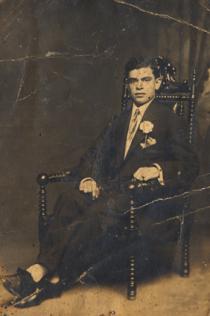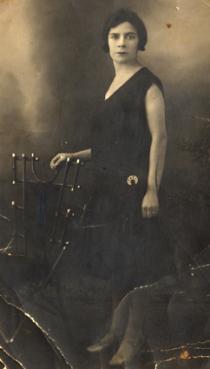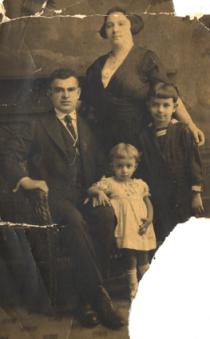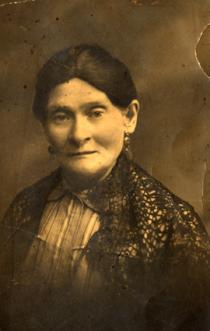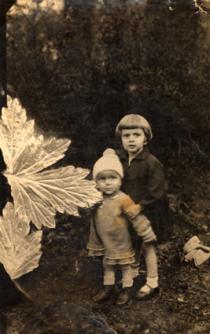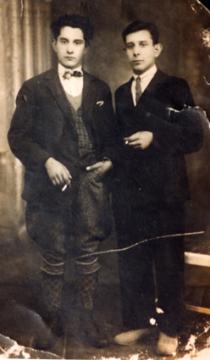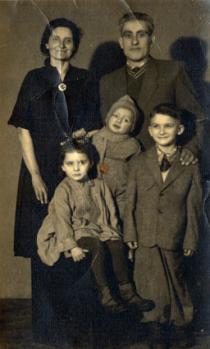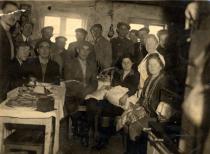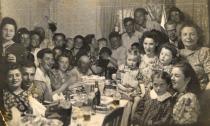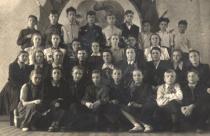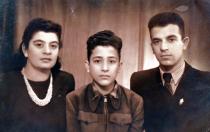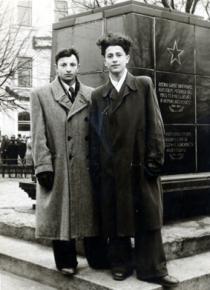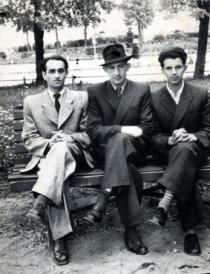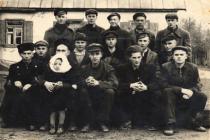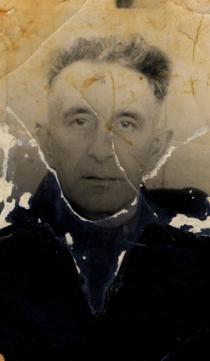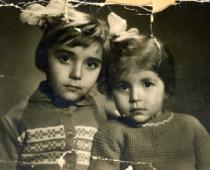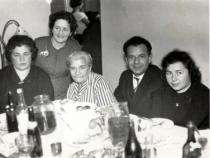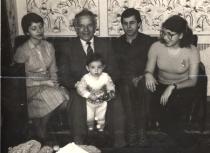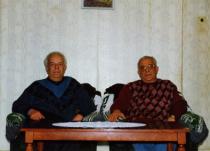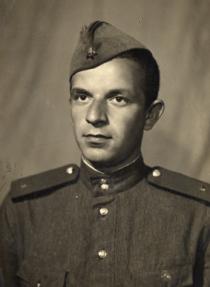
Boris Shteinas
Siauliai
Lithuania
Interviewer: Zhanna Litinskaya
Date of interview: June 2005
Boris Steinas is the chairman of Jewish community of Siauliai. He met me at the Siauliai bus station. I noticed him right away- a tall strong man of a typical Semitic appearance. Boris also identified me instantly and came up to me. He took me to the Siauliai community in only Zhiguli car. There his wife and sister-in-law, the activists of the community, were awaiting. The table was laid with typical Jewish dishes- matzah tsimes and chicken broth. We said at the table for quite a while, sharing our impressions. I had a feeling that I was in a true Jewish warm home. The next day Boris gave interview and I was convinced that he was a true Jew- smart, strong, kind and outgoing.
The Soviet invasion of the Baltics
My family background
I was born, raised, in Lithuania, and lived here most of the time apart from the period of evacuation and service in Soviet Army 1. I love this country and think it to be my motherland. I am nee Stein, and Lithuanian ending was added to my last name after war when my documents were issued. My first name was also different. My name was Aron. I had been called Orka since childhood. Russians turned my name into Borka and the name Boris Stein was written in all my documents. Thus, I became Boris, though I never forgot my nee name Aron.
I was named after maternal grandfather Aron Kagan. Unfortunately, I just know his name, as he died before I was born. I do not know what he did for a living. He was born approximately in the middle of 19th century in a small Lithuanian town Seduva [about 150 km to the west from Vilnius]. My grandfather, his wife Chaya and their children moved in Siauliai. When grandpa died, grandmother Chaya lived with our family. I loved her very much. I can say that it was she who raised my siblings and me. I do not know her maiden name. She was born in Seduva in 1860s. Chaya was a true Jewish lady. She was a true Jewish woman. She did not just mechanically follow traditions, but was a deeply religious woman. While she was alive, kashrut was observed at home, Sabbath and all Jewish holidays were marked. She was the pivot of religious life of our family. She did not let us forget about traditions of the ancestors. My parents worked hard, and feeling tired they most likely would not observe the traditions as ardently, but out of respect to grandmother, they went to the synagogue every Friday and Saturday. Friday evening grandmother lit candles being the oldest lady in the family. She had a white laced kerchief on her head. I had never seen her with her head uncovered. Grandmother Chaya was fluent in Yiddish and Lithuanian, therefore I think she should have got some elementary education. Grandmother did not know Ivrit. She must have learnt prayers by heart, as she did not read from the prayer book. She died in spring 1940 shortly before the Soviets came to power in Baltic countries 2. She was buried in Jewish cemetery without a coffin and according to the rite she was carried across the city on the boards in white shroud. We observed shivah after the funeral and I remember that father cut the collar of his clothes which was the sign of the mourning. (ф.1)
I do not know much about my mother’s relatives. She had a brother Simon ,who was several years older than he. He lived in American city Baltimore, had a family there. I do not know his wife’s and children’s name and have no information about their fate. Mother had sister Buna, who left for the USA in early 1920s with Simon. She also got married there. I do not know anything about her family either. (ф.2, 5) Mother’s sister Golda lived in a town Osmiani in the vicinity of Vilnius. Mother had not seen her sister for many years. Only in 1940 after Vilnius had been annexed to Lithuania 3, she visited us with her family. Golda did not have a chance to get evacuated. She and her husband perished during occupation in Oshmiany. Her daughter Leya Dveira, who married a Polish Jew, lived in Bialystok in Poland and also turned out to be in the occupation. .Leya Dveira and her husband were in ghetto and fortunately they survived. After war they lived in Bialystok and even wrote letters to my mother for a while and sent her pictures. With time, they stopped keeping in touch. I do not know further fate of Leya Dveira.
My mother Gitl Kagan was born in Seduva in 1900. She was the youngest in the family. Mother did not tell hardly anything about her education and life in Seduva. She got elementary education and knew hot to read and write in Yiddish. When she was in her teens, she became the apprentice of a milliner. Mother turned out to be a good seamstress. After World War One, mother’s family moved to Siauliai, where there were good conditions for development of private business. It attracted Jews from small towns, so they sought worthy opportunities in Siauliai and Kaunas. I think my parents met in Siauliai with the help of shedchans. They got married in 1927 with all rites and traditions being observed. My parents were wed under chuppah in choral synagogue of Siauliai. (ф.3,4)
I knew my father’s family very well. My paternal grandparents came to Siauliai in 1910. They were from small town Vaskiai. My grandpa Shneer Stein and grandmother Ester were distant relatives. Jews used to have marriages with distant relatives. At any rate, grandmother’s last name was also Stein. Grandpa was very handsome, and grandmother Ester was not attractive at all, even homely. It was not just my impression from childhood. Their polar appearance was discussed by adults all the time and I remember it. Nevertheless, they were not bonded only by children. I think they loved each other. I do not remember a single time when grandpa would hurt grandma or treat her with disrespect.
Shneer was born in 1870s. He was a tall and handsome man, with neat moustache (which aristocratic Lithuanians used to have. The latter mocked at long untidy khasid 4 beards and considered themselves European. I think my grandpa only finished cheder or elementary Jewish school. Grandpa was a glazer. I remember perfectly well that every morning ( we lived in one house, but in different apartments) grandpa Shneer left for work carrying on his shoulders a heavy box with glass. If the day was lucky, he came home to take more glass and have a lunch, which was served by grandmother Ester. She was a stout lady, which was about 10 years younger than him. Though, she was not as religious as grandmother Chaya, her head was always covered with a kerchief. (ф.12)
I knew two brothers of grandmother Ester- Pina and Kushiuel. They were much younger than Ester. Pina and Kushiel lived with their families in Vaskiai before the outbreak of great patriotic war 5. Kushiel had one son Yuda, and Pina had six children. His eldest daughter Etka is currently living in Israel. Her younger sister Cheva is also living there. Leya died young. Avrum and Tsima also passed away. Mina is living in the USA. Pina and Kushiel survived the times of evacuation and helped our family quite a lot in postwar times. Pina died in Israel in 1970s and Kushiel in Siauliai in 1970s.
Grandpa Shneer was a true head of the Jewish family. He had his place at the head of the table, which was not taken by anybody. Lunch never started without grandpa. Almost all children worked. Every Friday ( at that time salary was paid weekly) grandpa sat at the head of the table and all children gave him the money the earned. Grandpa took care of family budget and grandmother submitted to him unconditionally. Shneer loved, us grandchildren, very much and gave a little bit of money every Friday.
My father was the eldest. He was born in 1904. His brothers were Feivl, Sholom and Meishe and sisters Feige and Recha. Feiga was born after father. She remained single and lived with parents after war. Feiga worked at a factory and helped grandma about the house when she had a chance. Feige died by hunger in 1943, when she was in evacuation in Kazakhstan during the war.
Recha was born after Feige. She was a gorgeous lady. She married a Jew Feinstein in 1938 (I cannot recall his first name). I remember her wedding vividly. It was a real Jewish wedding. The bride and the groom were wed under chuppah in the synagogue. The wedding party was arranged in our house with great many guests invited. There were Jewish musicians, a lot of fun and dancing. The newly weds did not enjoy their marriage for a long time. Recha’s husband had heart trouble since childhood and he died in about two years after wedding. Recha and her son Iosif, born in 1939, stayed on their own. After war Recha did not come back to Lithuanian and happened to be in Kazakhstan with her son. Iosif got married there. He inherited father’s disease and also died young. In 1990 Recha and her grandson left for Israel. To my regret, I found out about it only several years ago. When I was in Israel, I was not aware that my aunt was there. So I did not see Recha there. She died three years [in 2002] ago in Israel. (ф.10)
The next was son Feivl, born in 1912. He worked at the plant. He got married 1938 , the same year when Recha was married. I also remember his wedding. His beautiful wife Rasl was from small town Linkuv. In 1939 she gave birth to son Abram. During the war Feivl and Rasl died in evacuation, and their son Abram survived it. He is still alive and healthy. (ф.12)
Father’s brother Sholom was born in 1922 after a long break. He worked in Siauliai at nail-making factory. He was underground komsomol 6, and when the Soviets came to power he became komsomol activist at the plant. When the war began, he and other members of komsomol were not permitted to leave the plant and we left for evacuation without him. In words of local citizens, Sholom was arrested and shot in Siauliai prison along with other members of komsomol and communist party during the first days of occupation.
My father’s youngest brother Meishe was born in 1925, when grandmother was rather elderly. Meishe was my friend when were kids. I loved him and mourned over when found that he died by hunger in evacuation.
My father had Hebrew name Kushiel. He was born in Vaskiai. I do not know what education he got. He most likely finished elementary Lithuanian school as he had excellent oral and written Lithuanian. Father did not serve in Lithuanian army. I remember someone from our family told that he drew a ‘blank’ card. He became a cabman at the age of 14. During on of his trips in Lithuania, he met my mother. Despite her being four years older than him, he fell in love with her once and for all. (ф.10)
Growing up
My parents started renting an apartment after wedding. It lived in the same house where my father’s parents-in-law were living. Grandfather Shneer rented an apartment on the second floor and we lived on the first floor. In 1929 my elder sister Chana was born. I came into the world on 19 May1933. This date is not exact. At that time the date of birth was recognized by the Jewish holidays. I know that I was born on holiday Lag ba-Omer, dated during the period of time when I was born.
We lived at 94 Dvara street. Dvara means Cathedral in Lithuanian. During the soviet time the street was renamed after partisan Marites Melnikkayite. Now the historical name of the street is back. The landlord of the house- Lithuanian Gelezhinete was a very sweet lady and grandmother Ester got along with her. The house was located in the heart of the city. I am still living on that street . (ф.6,9) I remember prewar Siauliai perfectly well. It was not a very big town. The population was about 40 thousand people. Half of Siauliai inhabitants were Jews, and the rest were Lithuanians, Russians, Poles. At that time the town was considered to be industrial center of Lithuania. There were a lot of enterprises here, which were mostly owned by Jews. In general, Jews had a very high economic and intellectual potential. Tannery business was also highly developed in Siauliai. Frenkel tannery and footwear factories, Murek and Krazinskiy tanneries were famous in entire Europe. There were other plants, e.g. – nail making plant, ,which was also owned by a Jew, Zif soap factory, well-known in Baltic countries, flaxen processing plant. Jews also owned posh stores, photograph salons, cafes. There was Milstein café in the heart of the town. We went there for deserts on holidays. There was also my favorite ice-cream café owned by Komash. Levin photo studio was the best in town. The owners of large textile, haberdashery, jewelry stores were also Jews. They were really very wealthy. There were less large stores in the vicinity of the market. There were mostly small shops, owned by less rich Jews. Some of them sold flour, bread, others manufactured goods. There were also kosher meat stores. All kinds of craftsmen had their shops there: cobblers, tailors, sleuths, joiners, barbers, glazers, working hard for their bread and butter. There was also Jewish intelligentsia in town. Here lived veneorologist Semion Bolner, who was renounced all over Lithuania. There were other highly skilled doctors- Epshtein, Borukhovich, Bleiner. There was even a Jewish hospital in town. To be more exact- the corps of municipal hospital pertained to Jewish health care organization .
Jewish charity was also very developed. The owner of tannery Frenkel was a true Maecenas. He maintained Jewish community. He built the synagogue for his workers. He maintained nursery home and orphanage. He even provided money for construction of one of the schools, which is now one of the premises of Siauliai university. Rich Jews organized free canteens for poor people. The religious life was only at a high level. There were seven synagogues in town, without taking into account minyan. The synagogues usually were classified by craftsmen merchants, cobblers, tailors. The main one was choral. It was a very beautiful stone building painted in white. It was called White Swan. We went there because it was close by. My father and grandfather had purchased seats there, where their tallith, teffilin and prayers books were stored in special cabinet.
Our family was not rich. We did not have our own apartment. Most of the money earned was spent on rent. Our family occupied three rooms. The house was wooden. It was heated by stove. We had solid handmade furniture. There was nothing extra, only necessary things. At any rate, every member of the family had his place to sleep. We ate at a dining table in a drawing room. Mother also used this room for work. She had two sewing machines Mother was often invited in rich Jewish homes, where she got orders for the whole families. Our kitchen was also large, though mother practically had no time for cooking. The oven which was stove which was stoked with firewood was in the center of the kitchen. It was used for heating and for cooking. The house where we were living was next to a large yard with kitchen garden and orchard, owned by our landlord. I was tempted to take an apple or a plum from there. Once, my father who was a very soft and kind person, slapped me for that. There was a wooden shed in the back yard. There were horses in that shed. Those horses helped father earn money. He delivered cargo throughout Lithuania. I loved horses. I particularly enjoyed giving them some tidbits- a hunch of bread, a lump of sugar. I do not remember their nicknames. Besides, we did not have one and the same horses all the time. Apart from being a cabman, father also sold horses. He bought and resold horses. Sometimes, he purchased old horses and sold them to sausage factories. I went to large markets with him couple of times. Horses were also sold there. I remember I was very sorry for those old horses, which were to be slaughtered.
Our family had a modest living. I remember that parents had a long discussion before buying us anything as they wanted to save money and to buy cheaper things. Besides, mother made most of the clothes for us. As for the food, it was lavish and delicious, though no dainties. We had meat every day, not only on the weekend. Meat was bought in kosher stores. Poultry was taken to shochet in the synagogue. An old shochet with a long beard cut the fowl, hang it over the tub for the blood to trickle down and then gave it to me. He did it in line with kashrut rules. (ф.6,9)
Sabbath meal was the tastiest and had the most variety of dishes. While grandmother Chaya was alive, she cooked Sabbath dishes herself. I loved noodles tsimes with chicken meat. Grandmother made noodles from high grade wheat flower. She also cooked floimen tsimes – beef, potato, plums. It is delicious. At times we went upstairs to see grandfather. The whole family went together to meet Sabbath. I remembered those days as grandparents had some sweets in store for the grandchildren. On Friday and Saturday father and I went to the synagogue. Mother went there only on holidays. She prayed on the second floor with other children. (ф.1)
Pesach, the biggest holiday, was my favorite. We usually celebrated it with grandparents. At any rate, we spent the first sedder in grandparents’ place. We got ready for the holiday in advance- there was a thorough cleaning of both apartments – ours and grandparents’. We cleaned floors, windows, koshered dishes. Part of the dishes- the most beautiful gorgeous dishes, goblets and tots, was stored in the garret. It was Pascal set of dishes which was used only once a year. We took out chametz, all leaven products- usually the remnants of baked bread were given to our Lithuanian neighbors. My sister Chana, younger Avigdor and I got new things, which we put on with pleasure. The table was laid in grandfather’s apartment. Usually grandmother and mother cooked the food. Apart from traditional dishes on that day there was gefilte fish, matzah, stew, fried chicken , all kinds of Jewish deserts- imberlakh, treilakh. Meishe and other boys asked grandfather the questions about the holidays. In late 1930s I had the honor to ask those questions .
All of us went to the synagogue on Rosh Hashanah. There was the shofar sound in town. Mother gave me the rooster, which I took to shochet in the synagogue. He rotated it over my head and read prayer in line with kaporez rite. I got used to fasting on Yom Kippur since childhood. I still keep this tradition. The sukkah was set up for the whole family in the yard on Sukkoth holiday. Grandparents and cousins came over to us on holiday. The most joyful holiday Simchat Torah was carried out in synagogue. It was fun. I remember songs and dances during the procession around the synagogue. We were looking forward to channukah as kids got money and presents on that day. Every evening mother lit candles on silver candlestick and added another candle every day. She placed it on the windowsill. On Purim mother baked hamantashen- tasty triangular pies with poppy seeds. My sister and I took shelakhmones to our friends and relatives .
I mostly was friends with my neighbors, among whom there were Jews and Lithuanians. We played different games which were typical for boys without thinking of nationality and origin. I do not remember a single case when someone would insult me because of my nationality I went to public Jewish school when I turned 6. It was not far from our house, so my parents chose it for me and my sister. Besides, it was free. I remember some of my classmates and teachers- Lerer Mates, Lipshits … It was elementary compulsory Yiddish school. I had studied there for two years before the Soviets came to power. There were several Jewish organizations - Makkabi, 7 Hashomer Hatzair 8, but I was too small to take part in them. I even remember that my father and I went to watch football at Makkabi stadium. In general my father used to reiterate that we should not be fond of politics, join any parties and be involved in politics. Our whole family was apolitical, and father was not aware that his brother Sholom was the member of underground komsomol organization (ф.9)
The Soviet invasion of the Baltics
I remember that in June1940 there was a soviet tank at Siauliai square and we, boys were running around it. We found it interesting. The soldiers treated us to sweets. On that day the doors of Siauliai prisons were open and convicted members underground parties were released. They walked along the street with red flags and father and I watched it. At that time many Jewish social organizations, several synagogues were closed, but school remained. When the soviets were at power, I went to school for a year and felt no difference. My parents did not discuss soviet regime in my present, but I think that just took it as the event that did not affect them. We were poor rather than rich, did not have our own property apart from two horsies , so repression went past our family. Well-off Lithuanian and Jewish population were repressed. All people who owned property were deported 9.
During the war
In summer 1941 I finished three grades of elementary school. It was Sunday, 22 June when the first bomb was released and we found out about the outbreak of war. The area of Murek tannery was bombed. It was not far from us and we, boys, ran there to take a look what was going on. It was an interesting event for us. The adults, especially my father, started talking of departure. My parents and their pals understood that the Jews should be the first to leave. By that time there had been a lot of fugitives from Poland in Siauliai. They told about the attitude of fascists to Jewish population. I should say, that almost all poor Jews left the city. Those people who were afraid to part with their wealth and hoping that it would help them find an understanding with Germans, remained in occupation. Most of them perished.
Fortunately, father had horses.. On the same day 22 June father and grandpa loaded the cart to took the linen, clothes. Our large family- we, parents, grandpa Shneer and grandmother Ester, Recha, Feiga and Feivl hit the road. Women and kids were on the cart. In 1939 my brother Avigdor war born. Recha gave birth to Iosif and Feivl and Rasl had son Abram. The rest, including my sister and I, had to walk. My father’s friend, Lithuanian Kasimiras Vitautas, who was working with father, helped us. Being father’s friend he was loyal to our family Kasimiras took us to the Lithuanian village, where he was from . (ф.10) We were given a very warm welcome. They treated us to potatoes, eggs and fresh milk. Soon we made friends with local kids and started running around the village. I liked being in village. So far I was pleased with my life during the war. While we were taking a rest, Kasimiras and father unbridled horse and went to Siauliai to take a look what was happening there. Monday night they came back with the full confidence that we had to move farther. Father hoped that he would meet Sholom, who was left at the plant, but he had not seen him. The adults started packing. Lithuanians, who housed us, started talking mother into leaving kids with them. They assured that they would treat them like their own children. My parents did not agree saying that we ought to stick together no matter what. I cannot recall the name of the village, the names of people, but I will always feel grateful to those common Lithuanian people, who sincerely offered their help.
We hit the road Monday evening, having decided to go to Vaskiai, where grandmother’s brother Pina and Kushiel were living. On the way to the east (Vaskiai was not far from the border on Latvia in the east of Lithuania). We were stopped for several times as on the roads were a lot of gangsters who deemed themselves to be the Lithuanian patriots, but indeed they were serving fascists. They searched the adults, the cart as if they wanted to find the weapon. The kids were crying, as they were frightened by the people they did not know. We were stopped by Vaskiai one more time. The Lithuanians with white bands and the guns were standing on the road. All men – father, Feivl etc. were told to stand by the curb with their hands up. Again people and carts were searched. We started crying, kids were crying. Women were twisting their hands as they understood that they we within a hair’s breadth of death. The owner of small store came up to them. He started asking who we were and where we were heading. Father said that we wanted to go to Stein in Vaskiai. The man said that we were on our way to his friend. He took the Lithuanians to lunch and talked them into letting us go. I will always remember that Lithuanian as he practically saved our lives.
We reached Vaskiai in about two days. It was an ordinary town. There were still a lot of Jews there. The situation here was rather calm as if there was no war. At any rate, the civilians were not affected by it. He had stayed there by Friday. On Friday there was a plane with unidentified signs on it ,which immediately became the subject of discussions. In the evening, the mayor of the town ( I do not know what his official title was) made an official announcement asking citizens to kept their window shutters closed for no light to permeate inside of the houses. At the same time komsomol members and other underground activists were arrested by the Lithuanians who were not pleased with soviet regime before arrival of Germans. I remember that all of them were taken in the old synagogue. At night the skirmishes started. It must have been between the soviet soldiers and Lithuanian “patriots».
Early Saturday morning we hit the road again. Now the families of Pina and Kushiel took their horses and went with us. Now, there was a whole string of carts. The cow was tied to one of the carts as babies needed the milk. We were traveling with the retreating units of the Soviet army. . There were wounded and dead among them. There were several bombings. In a word, the war did not seem to be interesting any more. I remember one case taken place in Estonia. We decided to spend a night on one of the farmsteads, unbridles the horses as they also needed to rest. At that time a young man came into the yard. Soon he got on the bike and left. The hostess came and said that everybody should leave. The hostess came out and said that we should leave immediately. She was afraid that the Estonian guy who came might bring the gangsters. Again, we had to leave. We were on the whole night to cover as much distance from the farmstead as possible. Somewhere on the road we left our cow and headed farther. We crossed, Estonia and Latvia and reached a small Russian town Pskov, which were several kilometers away from Russian and Latvian border.
Pslov was on fire. Wooden houses were burning as a result of bombing. Militaries came up to us and put some serial numbers on our horses. We were taken to the train station on the horses which used to be ours. Kushiel and Pina did not want to give away their horses and took rid them. We lost Feivl and his family at the train station. It turned out so that we took the train outbound with the fugitives to the east. The locomotive train was packed with people. I remember our trip very well. I cannot recall what we were eating on our way. We traveled for about two weeks and finally came Kazan' , Tatarstan [about 800 km to the east from Moscow]. All people got off the train in Kazan' and went to the evacuation point, where they had meals and shower.
We were sent to the station Shemordan which was 100 km away from Kazan'. I do not remember our trip, whether we took the horses or car. We were housed in the barracks. The next day, adults went to work at the silo. Only grandfather Shneer and grandmother Ester did not work. Early in the morning my parents, Feige and Recha went to the silo and came back home late at night. There were almost no conveniences in the barracks- just sinks with water taps and bunks. All of us got the cards 10. We did not starve for a while. There were several more Jewish families in Shemordan, and one of them was our acquaintances from Vaskiai. Sister and I went to school. It was a Russian school and at first it was hard for us. Brother Avigdor went to Tartar kindergarten. Adults, especially grandparents, were worried as they got no news from Feivl, Kushiel and Pina. Grandmother often cried.
The real trouble started in winter 1942 after father had been taken in the army. When 16 Lithuanian division was formed 11, all men , even grandpa Shneer got the notifications from military enlistment office, but he was not admitted. Meishe also did not suit them as he was too young. My father was taken there. It happened in January 1942. It was 45 degrees below zero, so mother did not let us see father off. (ф.10) In winter 1942 we were really starving. I went to the store, where I helped loading bread off and tried to take a pinch from heavy underbaked bread. Grandmother and I went to the village to exchange our things for products. Mother started selling the things which she did not want to let go- jewelry. There was a small stove in the barrack, but it was not enough to heat the large premise. Besides, there were a lot of crevices.
Soon we got the letter from father. He wrote regularly. He started looking for our relatives as soon as he was drafted in Lithuanian division. He managed to find Feivl via some information bureau . Feivl and his family lived in Kazakhstan, Frunze [about 3000 km to the south east from Moscow ]. Then he found out about Pina and Kushiel. They traveled on horses and reached Vologda region, got settled in a village and stayed there until the end of war. Feivl wrote a letter and grandpa responded. They kept in touch since then. Feivl talked grandpa into moving in Frunze saying that it was warm there, a lot of fruits and vegetables, grandpa left. Other people also joined him. Only my mom was really stubborn saying that she and her kids would stay in the place, wherefrom her husband left. I think she and her parents-in-law had either conflict or misunderstanding and she was decided not to leave. Grandparents, Feiga and Meishe left. .Mother, Chana and little Avigdor stayed. Life was even harder on us now. Mother sold almost anything she had. Chana and I went to the forest in early spring. We plucked the herbs, nettle and mother made soup from that. Then there was a season of mushrooms and berries. Once we got mushroom poisoning and our family barely survived. Father often wrote to us. We were agog to see the mailman. Father was in the reserves, but still he was at the leading edge, in the vicinity of Kursk 12, he was even contused. He was in Lithuanian division until the end of war. He happened to be in Sovetsk, Kaliningrad oblast, when the war was over.
After the war
On 9 May 1945 I went to school being in high spirits as we got the letter from father, where he was saying that the war was about to finish. During a lesson, a teacher, Tartar Amina, ran into our class and said that there would be no school today as the war was put to an end. There was so much joy, so many tears! We ran home. In the evening , there was even a party in the club. (ф.17)
Father was demobilized before soon –in late May 1945 he came back in Siauliai. He found his friend Kasimiras, who gave him a small room in his apartment. Kasimiras helped father buy a horse and father became a cabman again. Now he and Kasimiras worked for some town enterprise- supplied bricks, cleaned shambles in town. Father started thinking of sending a letter of invitation to us. It was no easy. We got the necessary permit only in September. In October we took locomotive train and came back home. (ф.10) Our trip was for more than three weeks. I remember that on our way during maneuvering I was thrown to the stove and got a hand burn, but it was not that important as compared to coming meeting with father.
We came in Siauliai early in the morning. It was a surprise for father as we did not tell him the details. We came out to the rail station square and were appalled. There were shambles all over. We could not recognize our town. Mother came up to the cabman and asked to take to Basanavichus street. My mother spoke Lithuanian with Jewish accent, so they asked where we were from and whom she was looking for. She said that she was looking for Steinas and all cabmen came up to us. They were happy for father as his family came. We got on the cart and went to father. Early in the morning we knocked at the unknown house. I do not remember who opened the door, but mother was recognized and seen in father’s room right away. Father was still asleep. He could not believe his happiness when he saw us. We hugged each other rejoicing and crying. They laid the table right away, putting everything they had from their scarce reserves. Mother was afraid that we might have a volvulus after eating so much. She did not let us overeat. Father friends started brining products one by one. One day they even brought the whole piglet. They took flour, cereal, vegetables in sacks. In a word, they welcomed us as their closest people. Thus, we settled in a small room in Kasimiras’s place. There was not enough room, but nobody hurt us for the half a year while we had lived there. Father was a modest man and could not get what he wanted, without being able to occupy a free apartment. Besides we also needed the place for a horse.
Finally, in 1946 we were given apartment in the outskirts of the town. It was an apartment with large bedroom kitchen with a stove. There was a shed in the yard, where we could put a horse. We did not have money for the furniture. Some of pieces were brought by father’s friends and some of it was made by ourselves. We did not have a worse living than most of the people who back from evacuation. We found out that almost none of our pals came back from evacuation. Feivl and his wife Rasl died by hunger in evacuation as well as grandpa Shneer and grandmother Ester, Feige and Meishe. Only Recha with son Iosif and Abram, Feivl’s son, survived. I found out about than only in the 1990s. At that time we thought that all of our relatives left.
We had to go on. Chana and I went to school. It was a Russian school. Now it was easy for me to study as knew Russian already. Avigdor spoke only Tartar. He even could not understand mother. I knew Tartar so I interpreted for them. I was not a mediocre student at school. In 1948 I finished 7 grades. Chana left school and went to work to the former tannery owned by Frenkel. Now it was named after Engels. (ф.17,19,20) I joined komsomol when I was at school, but I was not interested in social work. My close friends, classmates were both Russians and Jewish. I felt no anti-Semitism. Our family was needy, so I went to work after having finished school. I worked at the same plant with Chana.
I was in the youth brigade. We were called Molodaya Gvardiya 13. We worked in the origination workshop. I had worked here until 1951. In 1951 I went to study in the evening school and finished one more grade. By that time we moved in another apartment. We rented apartment in the downtown area. It was more convenient for us. The landlord, Lithuanian, also worked as a cabman. One evening, our neighbor Micho Chase came over. He was the director of the jewelry store. He suggested that my parents should send me in Moscow to study. He said that there were courses of appraisers of precious metals. I still remember that discussing- we were sitting at a round table. My mother had frightened eyes. How could she let her favorite sonny go to another city? It took Michor long time to convince parents and explain the advantages of my education. Our neighbor Chaya came. Her sister lived in Moscow and agreed to provide lodging for me. I came to Moscow and stayed at the place of Chaya’s sister, Faina. I still remember her apartment. It was a huge room with numerous partitions. Here her husband and she lived as well as many of her children with their families. They also found a place for me in the corner of the room. I was given a warm welcome. I was not hungry. I had meals with everybody. I did not have enough money, so I hade to learn how to be a stowaway. I studied at the courses for three months and then came back in Siauliai.
I was offered a job right away. I worked at the pawn shop. I was still living with my parents. In spite of having a job, we still had a very modest living. My salary was a considerable makeweight to the family budget. We marked all Jewish holidays with the family. There was no synagogue in town. The Jews who had to face the horrors of concentration camps and ghettos told us the stories, including the ones relating to betrayal of Lithuanians. In my point of view, it had a negative impact on relationship between Estonian and Jews and became one of the reasons of immigration of Jews, which commenced in early 1950s. (ф.15,20)
I worked only for a year and in 1952 I was drafted in the army. During my work at the plant, there were people who offered recruitment at KGB. 14. I dreamt of the military jacket and found military service very romantic, but father was flatly against my working in state security and had me give my word that I would never join militia or KGB. When I was in the army I was enrolled in sergeant school, and after that I was assigned in aviation in aerodrome maintenance. I worked with radars. Then I was transferred to Kovel. I had business trips to other towns, for instance in Saratov. I got along with my colleagues. I even thought of extended army service. Though, it was in the doctors’ plot 15. The anti-Semitist campaign was in full swing in the country. Every paper published the articles about doctors- poisoners. Those articles were read during political classes. My moral state was very difficult. I remember, once I was sitting at the table in canteen, and deputy political officer came up to me and said: «Steinas ,what is easier for you to pronouns corn or millet?». He picked the words with letter ‘r’ to hear my burr. I swallowed my first insult. There was another case. Before I was assigned on duty in the kitchen- one soldier came up to me- he was a member of national minority from Middle Asia and said: «Boris, let’s go in the kitchen, I will make you the cutlets, which kikes cooked for government ». I could not stop myself and beat him. I should say that Lithuanian guys who were in my unit, stood up for me. The insult that I had to see in the army, changed my attitude to military service and to life in general. When Stalin died in March 1953, I was to be in the sentry by the leader’s portrait. I was not mourning, just thinking how cold I got. I understood that he was a tyrant and thousands of people perished through his fault. (ф.13,11)
I was constantly writing home. Life was hard on my parents. Father worked very hard. In 1953 he was getting weaker and weaker. Mother sewed a lot and got kopecks for that. Father’s uncles- Kushiel and Pina helped our family. When they came back in Siauliai, they also worked for some communal enterprise. They provided for our family, especially when father started feeling sick. At that time we had problems. The landlord wanted to exchange his apartment, where I was living with my parents before army service, and evicted my parents. They had nowhere to go. There were litigations, but still the court made the ruling to evict my parents. Father wrote me a letter that they had no place to live Then I went to the commander of military unit and asked for permission to write a letter to the minister of defense Bulganin. I wrote a letter. Deputy political officer checked it and sent it in Moscow. In a week or two I came in the barrack from the sentry and saw soldiers clustered by my bunk. There was a letter from the Ministry of Defense lying on my pillow. The guys started crying out that I was to be demobilized. The letter was not about demobilization. The letter was sent to me with the copies to the military unit commander, chairman of Siauliai municipal authorities. The letter said that the secretary of defense of Lithuanian republic was instructed to provide permanent lodging for the family of military officer Boris Steinas. Soon father said that the chairman of ispolkom 16 came to them in person and offered a small apartment. He said it was temporary lodging and promised to provide a better apartment later. Parents were happy with that they got- a large room with the stove. It was their own now .
In 1954 I got the telegram from home. Mother said that father was afflicted with cancer and was dying. I was permitted to go home immediately. I saw my father alive, and he died in my hands. There were people in the community, who took care of Jewish funerals. Father was buried according to the Jewish rite- he was carried across the town and buried in shroud without a coffin. Jews prayed at home and at the cemetery. Shivah was observed. I was in the army, so my underwear shirt was cut not to spoil my military jacket . (ф.10)
In 1956 I was demobilized. I was offered to stay in the army, but I was looking forward to go home. I had to help mother, whose life was difficult. When I came home in late fall, my brother Avigdor wore slippers, as he did not have any other footwear. He worked at the same plant, where Chana started working. She was not in Siauliai at that time. In 1956 she got married. Her husband was son of father’s friend Kasimiras. His name was Vitautas. They fell in love with each other. It was a true love. Vitaustas’s mother was not alive, and Kasimiras wanted to be in relations with our family. Despite being friends with Kasimiras, my parents were flatly against Channa’s marriage with Lithuanian. Chana still married Vitaustas after father died. They decided to live for Carelia. I bore grudge against sister not for her marriage with a Lithuanian, but for leaving mother in hard minute. I even did not respond to her letters, which she sent in my military unit. (ф.20)
When I came back from the army, I moved in the apartment, which my parents got. Again, our living was poor. I even did not have a place to sleep. Brother and I slept in the old cart in the yard. I wore military uniform for a long time as I did not have any other clothes. I started looking for a job right after I came back . (ф.14) According to the law, I was supposed to be employed at the same place, wherefrom I was drafted in the army. The company, I worked for, was relocated in Riga. I was offered a job in Riga, but I turned it down as I was not willing to leave my mother. It was harder for me to get a job as there were a lot of redundancies in the army. There was a special employment center in Siauliai for the demobilized, but they assisted only officers, but I was only a sergeant. Once, I was called in military enlistment office and offered a position of the head of the military squad at the aerodrome. I went there. I was welcomed there, but still I was not sure whether to proceed. At home, I had a long conversation with mother after four years in military service, or drilling and disciple, it was hard for me to agree to extended service. Mother supported me saying that I was not made for military service
In April 1957 I found a job finally. There was a cooperative trade in Siauliai and I got the offer from there. Practically I and a Jew from Vilnius founded that organization. At first, I was HR manager with a skimpy salary of 640 rubles, but still it was a big help for the family. I bought shoe brush when I got my first salary as I was used to polishing my boots in the army . In a while I was transferred to the position of a commodity researcher. I was an interesting job. I traveled on business throughout Lithuanian, entered into deals, had meetings. In 1957 I became the candidate for the communist party, and joined it in a year. In a while the director of our organization was fired for abuse and I was named acting director for the period of liquidation. I showed such a good performance that the company was not closed down, but reorganized. I became the director of this enterprise. The only condition was that I should get education. No matter whether I wanted it or not I had to enter Vilnius college. The person in charge of extramural studies came over in Siauliai to talk me into studying there. It was she who helped me enter and finish the college. After that I entered extramural department of Moscow economical institute and graduated from economics department. Before graduation from the college in 1964 I was elected chairman of Siauliai regional consumers’ council. I had worked there for 30 years until retirement. In 1996 I retired. I should say that I met very good people at work. We got along very well and I felt no anti-Semitism. I think with my excellent organizational skills, I would take a higher position, if I were not a Jew. I was not promoted to any other positions within 30 years, and I did not get any offers for a higher position. (ф.14)
Once in 1959 I came home from work. An unfamiliar lady was sitting at the table with my mother. Mother said- have a look. It was my sister Chana. She was pregnant. She came fore a visit with her husband from Carelia and said how hard it was to live afar from home. Having forgotten the past, I suggested that they should live with us. Chana gave birth to a son in Siauliai . He was given Lithuanian name Kestas. At that time I held the position of the chairman of consumers’ council and started thinking of asking for apartment for sister’s family. I walked from one authority to another and finally mother and I were given two rooms in the communal apartment 17, and Chana staid in ours with her family. (ф.20)
In that period of time I met my future wife Frida Beitler. We were classmates. As it often happens, I did not pay attention to her at school. She entered Vilnius university and we had not seen each other for several years. Once we bumped into each other in town and broached the conversation. By that time I knew her father very well. He worked as a chairman of the cooperative society in Zagare, where Frida was born. She worked at school as a teacher of Russian language and literature. We started seeing each other and registered our marriage on the eve of year of 1960. (ф.22) The had modest wedding celebration, a dinner with kin and friends. We moved into a two-room apartment and I started looking into improvement of working conditions. We changed several apartments while I managed to get the permit for construction of the houses for the employees of the consumers’ council. We got a nice three room apartment in the house for the employees of consumers’ council and had lived there for many years. I got a four-room apartment in another house built for the employees of consumers’ council in 1980s. We are still living there. My sister and her family also moved there. I loved my sister very much. Unfortunately, she died in 2001. Her husband Vitautas and son Kestas are living in Siauliai. We often meet them. Kesas has two daughters- Eric and Elbert . (ф.20 Mother lived either with us, or with sister. She died in 1979.
Avigdor married a Jewish lady Luba in 1962 .He has two children: daughter Liya, 1963 and son Ilia , 1970 . In late 1980s Liya and her husband left for the USA. The rest of the family- Ilia with his family, Avigdor and Luba moved to Israel in 1990 . I was seeing my brother in Moscow, I sobbed like a little boy, thinking that I would never see him again. In 1991 I went to him for a visit. At first , Avigdor was a worker at the plant, but Luba found a job in line with her profession, a nurse. Brother and his wife are now living in Petah Tiqwa. My wife and I go to Israel. Brother comes to Lithuania. We write letters to each other and know what is going on in our lives. (ф.22)
In 1970s Pina and his family leaved for Israel and died there soon. Kushiel stayed in Siauliai. He died in 1980s.
My life was not bad. My wife and I had lived in love and understanding for many years. In 1960 our elder daughter was born and younger Lina was born in 1963. We lived comfortably. I had access to the goods which were in deficit. During the soviet regime it was very problematic to buy what you need. My daughters were always well dressed. We bought things for them in stock markets. I should say that neither Frida nor I abused my position and we got only necessary things. Frida taught Russian language and literature and school, so we had enough money. (ф.18) In 1980 I got a car ,which I am still driving. We also got a land plot and built a small country house there. We have a kitchen garden there where we plant vegetables and flowers. We had a good living in soviet time. Every year I got trip vouchers and Frida and I went to the resorts in Crimea an Caucasus. Daughters took a rest in children’s camps in Palanga. At times the whole family went there on vacation. We also went to Moscow, Leningrad, where we attended theatres, museums and other places of culture.
My elder daughter Rita has dreamt of being an investigator since early childhood. There were a lot of trouble with the entrance exams, but still with my help she was enrolled for legal department of Vilnius university. Rita is currently working as the head of the strict- security camp in Vilnius. Of course, this is not a job for a woman, but daughter copes with it. This is what she wanted. Her first marriage with a Jew Erenburg happened to be unsuccessful. Rita has a son from the first marriage. His name is Gedeon. He lived with us for a while. Rita’s second husband is Lithuanian Balsaris Alfonsas. He treats my daughter and grandson very well. Rita gave birth to two children in her second marriage – son Egidios, 1986 and daughter Samantha, who is studying in the last grade of the secondary school.
Younger daughter Lana graduated from Siauliai Teachers’ Training Institute. She has worked for three years at school, and she said she would never work there. Now she is working for a private company. Lana has her own apartment, but unfortunately, she has not met her beloved yet. She is single.
I have lived an honest life. Though I was a member of communist party and had management positions, I never broke my principals and remembered that I was a Jew. While mother was alive, we marked all Jewish holidays. After her death Frida and I also bought matzah, marked Pesach, Rosh Hashanah. I always fasted on Yom Kippur. In 1960s during the six-day 18, Yom Kippur wars 19 I always supported Jewish state. There were cases when I was called in the municipal party committee and asked to hold a speech with defamation of Israel, I also refused doing that . I had not stigmatized myself. (ф.21)
In 1988 Jewish community was revived in Siauliai. Dmitriy Tsinovoy became its chairman. Frida and I started being its active members right away. There were about 500 in Siauliai at that time. We got together on Sabbath and on holidays. I am grateful to the founders of the community, who are no longer alive – Leiba Lipshits, Grisha Rafael, Lazar Soloveichik. In 1997 I was elected the chairman at the general meeting of the community. I was still working and did not want to agree to that. My Frida, convinced me saying if not we who else would take care of the Jewish life. Since that time I am a permanent chairman of Siauliai Jewish community. The municipal council leased the building of the former Volgart hospital to the community and I find the way to get the money to cover the lease payment. I find the sponsors both among the citizens of Lithuania and in foreign countries as well. We help needy lonely Jews, have all kinds of cultural program. We founded the club Gesher for the Jews of middle age. We have an excellent Jewish children’s band, who took the first prize at the festival in Vilnius. My Frida helps me a lot. At home I have a real hearth. Now I enjoy what I am doing – reviving Jewish life. Though I am not a young man, I hope I will be useful for the Jewish community. (ф.22)
GLOSSARY:
